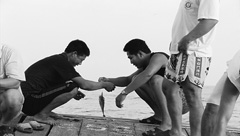Chronicle of the Sea, Nan-Fang-Ao
 TAIWAN / 2004 / Taiwanese, Mandarin, English, Tagalog / Color / 35mm / 98 min
TAIWAN / 2004 / Taiwanese, Mandarin, English, Tagalog / Color / 35mm / 98 min
Director, Producer: Lee Hsiang-hsiu
Photography: Chin Ting-chang, Shen Jui-yuan
Editing: Shiau Ru-guan, Naxi Chao
Sound: Lin Hsiu-long, Chi Wu-wei, Lee Hsiang-hsiu
Music: Chen Jian-nian
Source: Lee Hsiang-hsiu
Nan-Fang-Ao, a village in northeast Taiwan, once thrived on its big-net fishing industry. Now migrant workers from the Philippines and China vigorously live and work with the locals on one of the few remaining fishing boats. As we observe their life at sea, where the air is abuzz with different languages and gestures, thoughts of home drift among those who have come to provide for their families. There is the captain who talks about the old days, the woman who sent her husband off to sea and runs a shop in the village, and the laborers from foreign countries who buy gifts for their families at the market. With a fresh look, the film depicts people living on the unchanging stage of the ocean’s vast wilderness.
[Director’s Statement] Chronicle of the Sea, Nan-Fang-Ao tells the story of a group of people whose lives depend on the sea, and how they accept their fate while searching for dignity and pleasure in their lives. Taiwanese, mainland Chinese and Filipino men all work on the same boat. They each face their own predicaments, and miss their wives and children as they try to provide for them.
The film is a lyrical meditation on the age-old relationship between fishermen and the sea, mingling loneliness, nostalgia, hopes and dreams. Between these men and the ocean, there is both symbiosis and struggle. The dangers of life at sea and the unpredictability of their income make uncertainty part of the collective consciousness of fisherman. While the film shows how hard these fishermen work, it also reflects the conflict between man and marine ecology. The continued decline in the number of fish and the elimination of mackerel purse seine fishery raises the question: what does the future hold for these people?
Taiwan is an island, surrounded by the sea. Yet during the many years of martial law, access to the ocean was restricted; only professional fishermen could leave the shore. Most Taiwanese people have had little chance to imagine what life on the open sea is like. Therefore, the very production of this film is significant.
For a female producer and director, making this film was particularly difficult. The difficulty lay not in entering the masculine society of fishermen, but rather, in the traditional taboo forbidding women from going out to sea on fishing boats. However, I always gain knowledge from making a documentary, and I also experience the sorrow, pain and joy of life through the characters in the film. In the end, I am always the one who benefits most.
 Lee Hsiang-hsiu
Lee Hsiang-hsiu
Born 1964 in Taipei, Taiwan, Lee Hsiang-hsiu received her M.F.A. in Film and Media Arts from Temple University (Philadelphia, USA) in 1998. In 1993, she worked as Ang Lee’s personal assistant on Eat Drink Man Woman. In 2000, she also worked as the first assistant director on Lin Cheng-sheng’s Betelnut Beauty. Currently, Lee is an independent filmmaker, a lecturer in the Department of Radio, Television and Film at Shih Hsin University, and a Ph.D. student at Tainan National College of the Arts. Her first documentary work, The Lost Kingdom, was nominated for Best Documentary at the 1999 Hawaii International Film Festival. The film also won the NETPAC Prize for Special Mention in the 2000 Taiwan International Documentary Festival. Chronicle of the Sea, Nan-Fang-Ao is her second feature-length documentary, and won the Taipei Golden Horse Award for the Best Documentary in 2004. |
